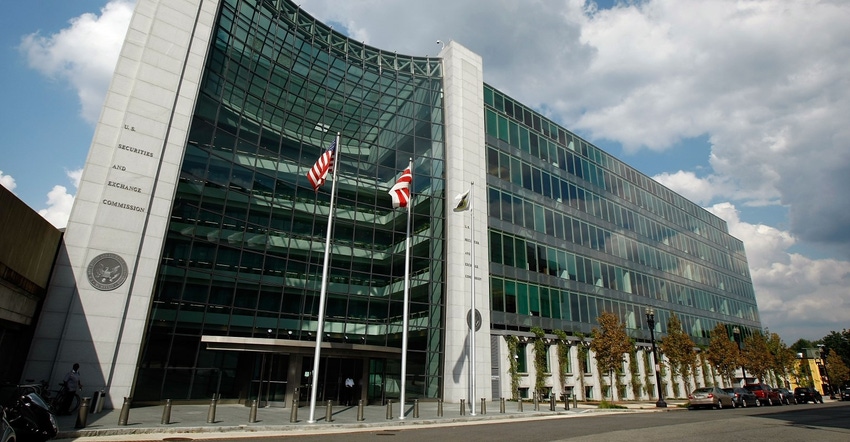As currently drafted, climate-related disclosure requirements would overly burden American farmers.

Agricultural groups offered widespread criticism to the Securities and Exchange Commission proposed rule on climate-related disclosures. The comment period closed June 17 and ag groups had already previously asked for additional time to offer their insight into a rule that they say would be nearly impossible for family farms to comply with today.
The proposal would require public companies to report on Scope 3 emissions, which are the result of activities from assets not owned or controlled by a publicly traded company but contribute to its value chain. While farmers and ranchers would not be required to report directly to the SEC, this regulation would impose additional burdens as they provide almost every raw product that goes into the food supply chain.
The Agricultural Retailers Association, American Farm Bureau Federation, American Soybean Association, National Association of Wheat Growers, National Cattlemen’s Beef Association, National Corn Growers Association, National Cotton Council, National Pork Producers Council, National Potato Council, North American Meat Institute and U.S. Poultry & Egg Association jointly filed comments which highlighted the positive actions famers and ranchers have taken the last two decades to reduce pre capita agriculture emissions by 20% and reduce greenhouse gas emissions from livestock by 11% for beef, 21% for swine and 26% for dairy, all while increasing productivity and output across the agriculture industry.
“Without changes and clarifications, the proposed rules would be wildly burdensome and expensive if not altogether impossible for many small and mid-sized farmers to comply with, as they require reporting of climate data at the local level. When farmers and ranchers cannot afford the overhead required to comply, they will have no choice but to consolidate,” the organizations write.
Related: Ag groups want more time to evaluate SEC rule
The groups recommend the SEC removes the “value-change” concept from the proposed rules. They also suggest removing or substantially revising the Scope 3 emissions disclosure requirement to include an explicit exemption for the agricultural industry. Another suggested change is removing the requirement that registrants provide disclosures pertaining to their climate-related targets and goals and revising the proposed rules so that disclosures of GHG emissions operate in unison with existing federal emissions reporting programs. They also ask to ensure the final rules do not include location data disclosures for GHG emissions, which may inadvertently disclose the private information of family farms.
“Family farms don’t have teams of compliance officers and attorneys to respond to Wall Street. Higher costs could keep small farms from doing business with publicly traded companies, which could lead to more consolidation and fewer farmers at a time when the world is increasingly calling on rural America to meet the needs of hungry families,” says AFBF President Zippy Duvall.
While the proposed rule is aimed at public companies, mandating the disclosure of scope 3 emissions would place a burden on cattle producers who supply beef to public entities, NCBA says. Additionally, the federal government has acknowledged that accurately calculating emissions on the farm or ranch level is impossible, while industry-wide metrics are already collected by the Environmental Protection Agency and USDA at a level that should satisfy federal regulators.
In addition to NCBA submitting technical comments with the other agricultural groups, individual cattle producers submitted over 6,700 letters to the commissioners of the SEC and members of Congress to inform them of the widespread unintended sequences this rule would have on the cattle and beef industry. Numerous NCBA state and breed affiliates submitted comments as well.
“Cattle farmers and ranchers are America’s original conservationists. Thanks to decades of innovation and continuous improvement, cattle account for just 2% of overall U.S. greenhouse gas emissions,” says NCBA Environmental Counsel Mary-Thomas Hart. “Cattle producers have a proven track record of sustainable practices and should not be penalized with overreaching rules from an agency with no expertise in agriculture.”
The U.S. pork industry represents a mere one-third of 1% of U.S. climate emissions. Despite this, American pig farmers have managed to shrink their GHG footprint by over 21% over the last three decades while at the same time, the industry has increased its production of affordable pork for consumers by 77%, explains Michael Formica, NPPC assistant vice president and general counsel. “This demonstrates not only the commitment of farmers to address long-term sustainability challenges we all face, but also that voluntary, market-based incentives have helped make real progress on climate change.”
Formica adds, “Costs associated with the proposed rule would be significant, especially for small to mid-sized farms and would lead to industry consolidation and further impact not just rural communities where those farms are located but the ability of every American to enjoy bacon with breakfast.”
The National Milk Producers Federation also detailed in their own comments that the climate disclosures could undermine the dairy industry’s progress toward its sustainability goals and create far-reaching technical and financial challenges for American dairy farmers and their cooperatives. NMPF comments emphasized the significant financial burden the proposed rule would have on dairy farmers and their cooperatives related to the collection and aggregation of on-farm GHG data.
To track progress and reach important environmental goals to achieve industrywide neutral or better greenhouse gas emissions, optimize water usage and improve water quality by 2050, the National Dairy Farmers Assuring Responsible Management Program in 2017 launched the Environmental Stewardship platform. The program provides a comprehensive estimate of GHG emissions and energy use on dairy farms with a suite of tools and resources for farmers to measure and improve their environmental footprint. FARM ES is the dairy community’s platform for a consistent, unified approach to GHG measurement that is free and accessible to all dairy farmers. Currently, over 80% of U.S. milk is handled by cooperatives and processors participating in FARM ES.
About the Author(s)
You May Also Like





